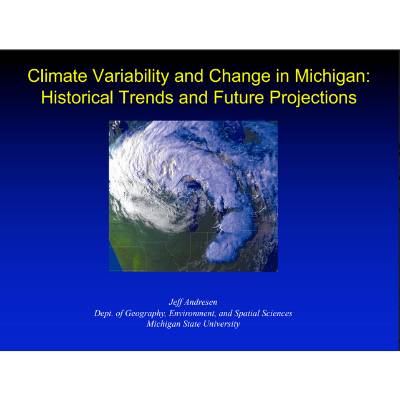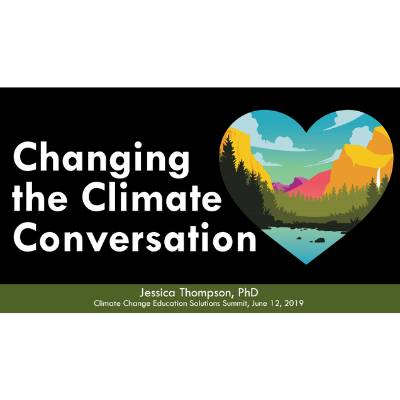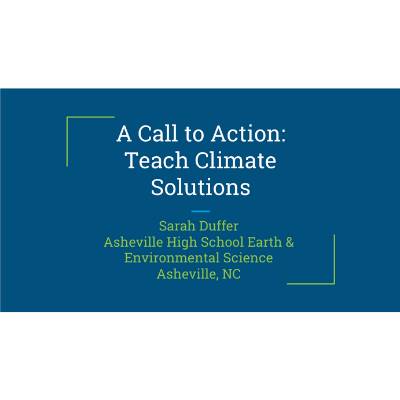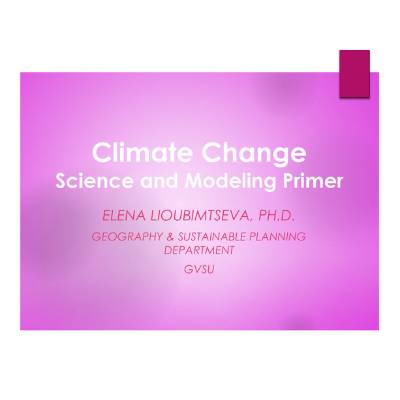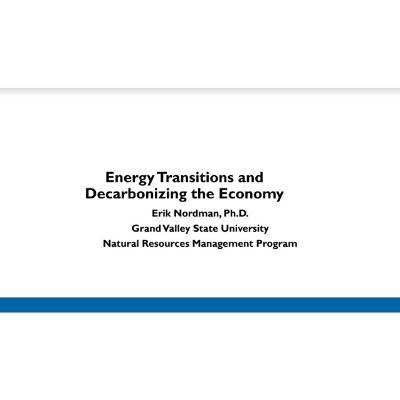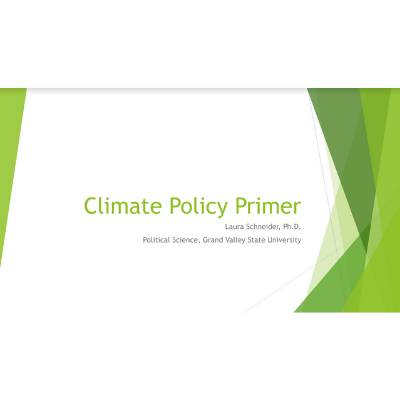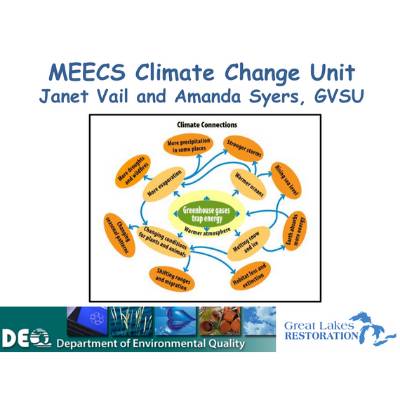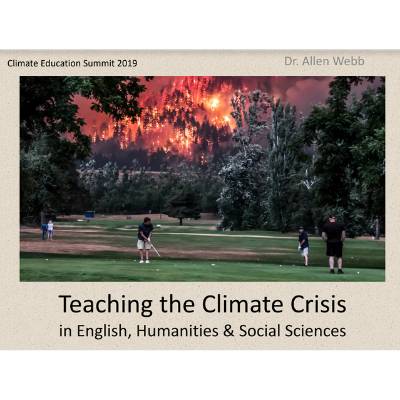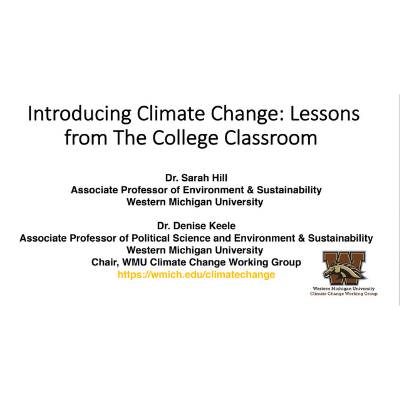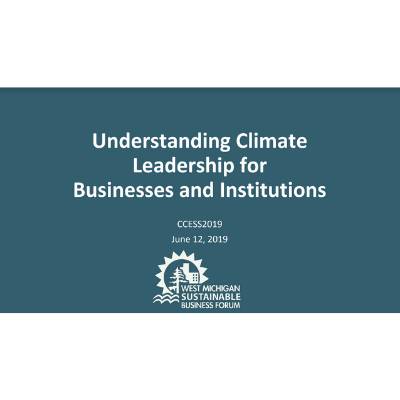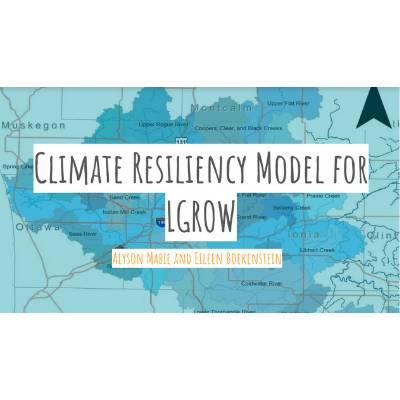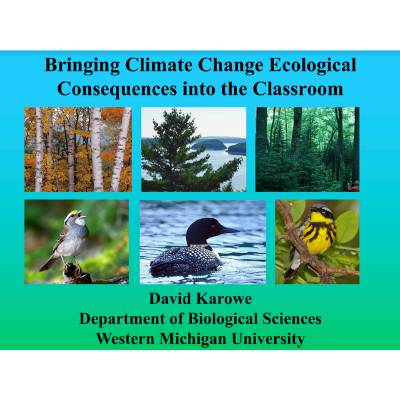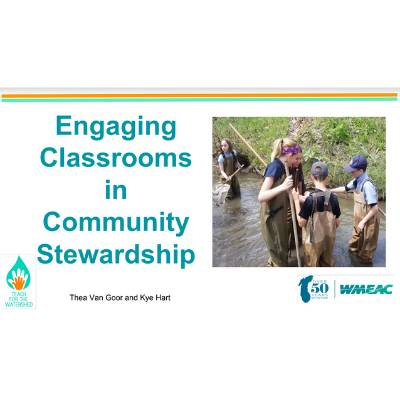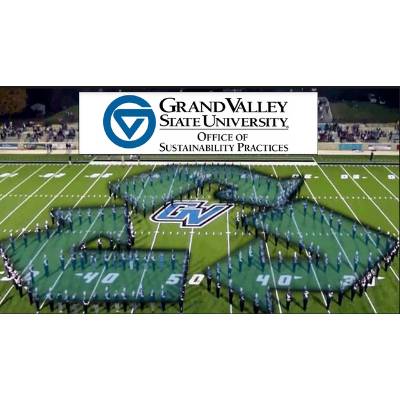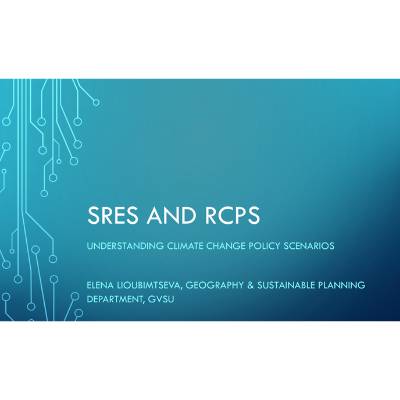CCESS 2019: Presentations and Abstracts

Climate Variability and Change in Michigan: Historical Trends and Future Projections
Presentation Title: Climate Variability and Change in Michigan: Historical Trends and Future Projections
Speaker: Jeff Andresen
Abstract:
Climate in the Great Lakes region of North America has varied widely in the past and further changes are projected in the future. This presentation will explore long term historical trends and patterns, recent observed trends including warmer mean temperatures and greater annual precipitation totals, projections of future climate, and some potential impacts associated with the climatic trends.
Changing the Climate Conversation
Presentation Title: Changing the Climate Conversation
Speaker: Jessica Thompson
Abstract:Over the past decade Thompson has participated in dozens of projects across the Western US, Mexico, India, Singapore and Mongolia. The impacts of a rapidly changing climate are everywhere, yet we haven’t figured out how to talk about climate change with our friends and neighbors. Since the 1980s public conversations about climate change have been dominated by the language of science and politics. Our own fears of scientific inaccuracy and uncertainty – or political disagreement – have censored us from talking about how to live on a changing planet. This talk presents a new frame for conversations about climate change – place – places that matter. We can change the conversation about climate change by connecting the issues to the places and the people we love.
A Call to Action: Teach Climate Solutions
Presentation Title: A Call to Action: Teach Climate Solutions
Speaker: Sarah Duffer
Abstract:
What is Drawdown? Drawdown is the point in the future when we will sequester, or draw down, more climate-changing greenhouse gases than we are emitting into the atmosphere. In 2017, the Drawdown Team used peer-reviewed research to scale up, quantify, and rank the top eighty solutions that span seven sectors. The team also identified twenty “coming attraction” solutions that are not yet scaling but show potential as future drawdown solutions.
Explore solutions with your students through individual assignments, collaborative group work, problem- based learning, and an annual spring EcoChallenge. Integrating Drawdown into high school science classes is a way to shift our negative climate paradigm into a positive, constructive, action-oriented framework. Participants will pick up specific lessons and strategies for high school students to learn about and practice the Drawdown solutions to reverse global warming. All of Sarah Duffer’s curriculum will be shared with you. All lessons utilize technology to maximize collaboration.
This is an invitation to learn together, write curricula using Michigan academic standards for your students, and to share your outcomes!

Climate Change and Science Modeling Primer
Presentation Title: Climate Change and Science Modeling Primer
Speaker: Elena Lioubimtseva
Abstract:
An overview of the global climate system, greenhouse effect and factors of climate change. Attention will be given to interpretation of climate and weather data at a global and regional scales. Participants will familiarize with quantitative methods of climate change monitoring and modeling and reliable sources of climate data, relevant for classroom use.
Particular attention will be given to impacts of climate change on the United States, the Great Lakes Region, and Michigan, evidence of observed changes in our ecosystems and projected climatic biogeographic scenarios. Participants interested to learn more about the science and policy scenarios are encouraged to also attend the afternoon hands-on session on climate change modeling in Henry Hall 117.
Energy Transitions and Decarbonizing the Economy
Presentation Title: Energy Transitions and Decarbonizing the Economy
Speaker: Erik Nordman
Abstract:
For most of the industrial age, we had three mostly separate energy systems: one for electricity, one for transportation, and one for industrial and home heating and cooking. All three ran mostly on fossil fuels. Reducing greenhouse gases will require transitioning all three systems to electricity derived from zero-carbon energy sources. This session will prepare teachers to understand the scope of the challenge, the possible technology solutions, and the economic, policy, and social dimensions of the transition.
By the end of the session, attendees will:
- Understand the three energy systems (electricity, transportation, and industrial / home heating and cooking)
- Understand the current sources of energy for each of the systems, especially in Michigan
- Understand how these systems are and will continue to merge into one system based on electricity
- Identify technical options to generate electricity from zero-carbon sources
- Evaluate the economic, policy, and social dimensions of the transition to a “decarbonized” economy.
Presentation Title: Climate Policy Primer
Speaker: Laura Schneider
Abstract:
For the past thirty-one years, the international community has formally acknowledged the existence of climate change and put forth a variety of actions to address the reality of climate change. The United States government, has acknowledged climate change in some capacity since the late 1970s. Nevertheless, we have no federal policies to directly address the reality of climate change. Politics interferes with the creation of climate policy in the United States. This presentation will address the divergence between government and politics, a brief history of climate change policy attempts at the federal level, and what some states are doing in the absence of federal direction.

Michigan Environmental Education Curriculum Support (MEECS): Climate Unit
Presentation Title: Michigan Environmental Education Curriculum Support (MEECS): Climate Unit
Speakers: Janet Vail and Amanda Syers
Abstract:
MEECS stands for Michigan Environmental Education Curriculum Support. The goal of MEECS is to provide students in grades 3 through 9 (or above) with an opportunity to learn more about their environment through lessons in Science and Social Studies.
The MEECS curriculum consists of seven different curriculum units; Air Quality, Climate Change, Ecosystems & Biodiversity, Energy Resources, Land Use, Land and Environment, and Water Quality. The Climate Change Unit has Michigan-specific lessons that include seven climate science lessons and seven climate impact lessons.
Grand Valley State University and the Public Broadcasting Service have partnered with MEECS to create online support modules for MEECS Units. The video modules demonstrate hands-on activities, provide lesson objectives, and explain how lessons connect to teaching standards. The online support videos also demonstrate MEECS lessons being used in classrooms with students. These modules are free and available anytime to educators.
Teaching the Climate Crisis in English, Humanities & Social Sciences
Presentation Title: Teaching the Climate Crisis in English, Humanities & Social Sciences
Speaker: Allen Webb
Abstract:
Climate change raises social, ethical, historical, political, and philosophical questions and is crucial to English, social studies, humanities, and social science courses. This presentation helps teachers connect climate change to their subject area and equips them with specific resources, strategies, and assignments. While scientists have given us a timely warning, and engineers have provided tools that can help take it on, our society has still failed to address climate change. The problem is a failure of imagination, and a failure to understand social and political dimensions of the problem. Precisely the reason we have English, humanities, and social science classes.
We can equip students with the knowledge, passion, and tools they need to make a difference, including climate change focused research and writing skills, critical reading, visual and media analysis, communication technology and social media, and community education and organizing skills. Professor of English at Western Michigan University, and a former high school teacher, the presenter frequently teaches, researches, and presents about climate change. He is co-author of Teaching Climate Change to Adolescents: Reading, Writing, and Making a Difference, published by the National Council of the
Teachers of English and Routledge (2017)
Introducing Climate Change: Lessons from The College Classroom
Presentation Title: Introducing Climate Change: Lessons from The College Classroom
Speakers: Sarah Hill and Denise Keele
Abstract:
For the past five years, Western Michigan University has offered a 3-credit, 1000-level introduction to climate change which features an expert guest speaker for each topic. The course covers not only the science of climate change, but also reactions - from political, to psychological - to awareness of our changing climate. The course introduces students to alternative energy solutions and provides workshops, such as one for students to identify and challenge climate change denial propaganda. In this conference presentation, the course coordinators (political scientist, Denise Keele and anthropologist, Sarah Hill) will provide an overview of the course’s transformation as we have learned how to better meet students where they are when they start the course, and thus more effectively guide them to becoming climate “champions” upon completion of the course. The presentation will focus primarily on pedagogy and assessment.

Understanding Climate Leadership for Businesses and Institutions
Presentation Title: Understanding Climate Leadership for Businesses and Institutions
Speaker: Daniel Schoonmaker
Abstract:
Learn how Great Lakes businesses and institutions are responding to climate change within the operations, strategic planning and community relations. An introduction to global, regional and local investments and initiatives in climate leadership, and the material issues defining them, such as carbon reduction, emergency preparedness, science-based decision making, scope-setting, food waste, plant-rich diets, transportation, health equity and more. Will include case studies demonstrating application of climate adaptation and climate leadership in a K12 setting.
Climate Resiliency Model for LGROW
Presentation Title: Climate Resiliency Model for LGROW
Speakers: Eileen Boekenstein and Alyson Mabie
Abstract:
The conversation around climate change can be very broad and overwhelmingly negative, even hopeless. Often, it seems like too big of a task to handle. This presentation will confront the “What difference can I possibly make?” mindset with an “Every drop counts” philosophy. LGROW (Lower Grand River Organization of Watersheds), an agency of The Grand Valley Metro Council, has been working to establish a Climate Adaption Plan for our watershed that stresses the importance of small-scale efforts that collect into a larger change.
LGROW’s Climate Adaptation Plan offers strategies that will build better and more climate resilient communities through hands-on projects, data collection, and civic engagement. Educators will learn the benefits of tackling environmental issues at the watershed level, the unique challenges in our region, the role of planning and zoning, and how these concepts can be applied in the classroom at all grade levels. Bringing the topic of climate change from a global scale to a human scale allows students to see past the doomsday rhetoric and understand that every person plays a role in the future of our planet. Empowerment feeds hope, and hope fuels each action that leads to the larger change.

Bringing Climate Change Ecological Consequences into the Classroom
Presentation Title: Bringing Climate Change Ecological Consequences into the Classroom
Speaker: David Karowe
Abstract:
Climate change will have enormous ecological consequences in the Great Lakes region. The U.S. Forest Service has generated predictions about the fate of approximately 150 tree and bird species this century under two emissions scenarios: continuing along our Business as Usual pathway (4-5 degrees C warming by 2100) and implementing the Paris Agreement (2 degrees C warming by 2100). These predictions are publicly available online, so can easily be brought into the classroom. An example of how to do that, complete with a handout for students, will be presented.
Engaging Classrooms in Community Stewardship
Presentation Title: Engaging Classrooms in Community Stewardship
Speakers: Thea Van Goor and Kye Hart
Abstract:
The West Michigan Environmental Action Council (WMEAC) engages several thousand students a year across West Michigan with their foremost education program: Teach for the Watershed. Place-based outdoor education connects students to their local environment with lessons focused on storm water management and runoff impact issues. This session will give you pointers on how to get students excited about stewardship in their community through place-based education.
Fostering a sense of stewardship for their water resources, students are able to witness the effects of pollution firsthand. Students begin their learning with a classroom demonstration on how pollution, no matter the type, ends up in our waterways via storm water. A follow-up stream study brings students into the tributaries of the Grand River to discover how organisms living in our streams and rivers can be indicators of the quality of a watershed.
Getting out of their traditional classroom and into their local environment shows students how even the smallest of changes can help impact the environment and puts them in the mindset that they are all capable of being stewards for their communities.
Sustainability Practices at Grand Valley State University
Presentation Title: Sustainability Practices at Grand Valley State University
Speaker: Yumiko Jakobcic
Abstract:
This presentation will highlight Grand Valley State University’s sustainability practices related to climate change. GVSU values the guiding principles of sustainability in helping to meet the current needs of our faculty members, staff members, and students without compromising the needs and resources of future generations. We are committed to working with our community partners to create a sustainable future for our university, our community, our region, our state, our nation, and the world. We model applied sustainability best practices in our campus operations and administration, education for sustainable development, student involvement, and community engagement by promoting social responsibility, practicing fiscal responsibility, and encouraging environmental stewardship. We provide our students with excellence in education for sustainable development by imbedding theory, systems-oriented thinking, and service learning into our curricular and extracurricular programs. This presentation will cover topics such as GVSU’s solar garden, LEED buildings, and student engagement.

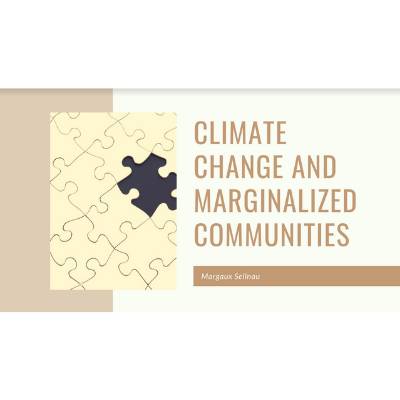
Climate Change and Marginalized Communities
Presentation Title: Climate Change and Marginalized Communities
Speaker: Margaux Sellanu
Abstract:
We invite you into a safe space to discuss how climate change disproportionately effects systematically marginalized communities. This presentation will cover the history of the climate movement, where it is at now, and where it is going. Attendees can expect to understand the way climate change affects marginalized communities, including recognize the faces of leading climate activists from these populations. Participants will also learn the importance of bringing everyone into the climate dialogue, and the steps towards environmental justice for all.


